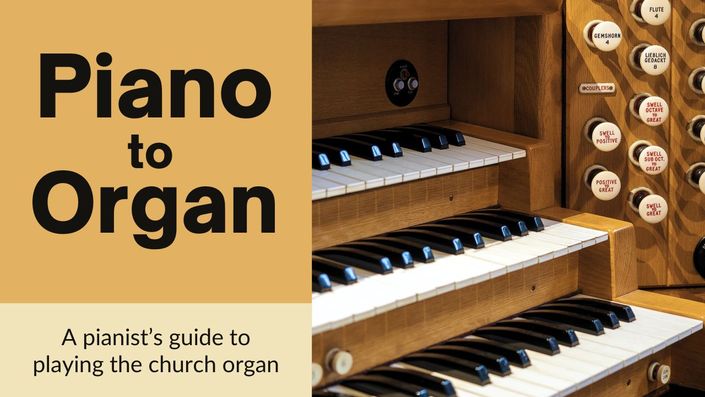
Piano to Organ
A specialist course for pianists and other keyboard players who wish to transfer their playing skills to the church organ.
Enroll in Course
What You Will Learn
Transfer your skills to this amazing and impressive instrument with the Piano to Organ course.
Are you a pianist ready to explore the majestic world of the organ? This course will introduce pianists to the fundamentals of organ playing. We'll explore how your existing keyboard skills can be applied to the organ, while also looking at its unique characteristics so that non-organ natives can get the most out of the instrument. By the end, you'll have a solid foundation for enjoying and playing the organ. During the Piano to Organ course we'll cover...
- Organ Consoles - Why are there multiple keyboards? What do all these stops do? How do the pedals work?
- Effective Repertoire - Which piano works would convert to the organ? Are there any musical periods or pieces you should avoid on the organ? What are some pieces written for organ that would be easily accessible for a pianist?
- Playing the Organ - How do you make a beautiful sound? What elements of a piece influence the choice of stops and manuals? How do you begin to incorporate your feet and use the pedals?
- Technical Choices - How would you simplify four-part textures if necessary? How does articulation and phrasing differ from the piano to the organ? What do you need to think about to make successful finger choices, substitutions and reallocation between the hands?
- Improvisation - How do you deal with introductions and gaps between verses? How do you go about improvising on hymns? How might you extend or cut short a piece to fit with a congregation or ceremony?
I'm only an hour through your first lesson here and I'm already wildly satisfied with your teaching method. The pace is perfect for where I am along my musical journey. I truly appreciate what you're doing here and can't wait to continue through these and move onto more of your courses. Concise and straight to the application of concepts just as it should be!
- Cole

Who Is This Course For?
Pianists wanting to build confidence at the organ so they are equipped to perform at church services.
Designed for pianists who wish to expand their repertoire and skills to include the organ. Whether you’re a church musician seeking to enhance your performance abilities, a teacher in need of occasional accompaniment, or simply a pianist with a passion for early music or multi-instrumentalism, this course offers a solid foundation for learning the organ. It’s ideal for those aiming to play the organ for church services, accompany choirs or ensembles, or build confidence for special occasions like weddings and funerals.
Do any of these sound familiar?
"I’m a pianist and I’ve been asked to play the organ for a service. I’m looking for a course that tells me all I need to know..." "I need to be able to play hymns but can’t cope with four parts. I’m looking for a way to simplify the number of parts..." "I’ve been asked to play the organ for a wedding but don’t have easy versions of the Bridal March and the Wedding March…" "I play the organ a bit but don’t really understand what to do with organ stops and the other organ accessories..." "I would like to learn how to play the organ but want some help to make a start before getting involved with a teacher…"
↓
I am an Organist in the Bishop Baughman United Methodist Church Freetown, Sierra Leone, West Africa. I've been watching your videos on YouTube especially those about harmony. I've learnt so much from you about harmony and I can now play and write hymns in four parts. May God bless you for sharing your gift with many.
- John

By the end of the Piano to Organ course you'll be able to…

Play the organ with an understanding of the various keyboards, stops, pedalboard, couplers, pistons, and swell boxes

Differentiate between the player’s touch at the piano and at the organ, and the implications for playing the organ including articulation, key release, and expression techniques

Identify piano pieces that translate well to the organ and explore accessible organ literature

Lead congregations with the skills to play, accompany, and lead hymn singing effectively, including introductions, transitions, and improvisation

Incorporate techniques for managing hymn verses, changing sounds, and adding stylistic flourishes

Play more confidently knowing what you are doing is right
I just wanted to thank you again for the tremendous accessibility of your website and its contents. It’s an absolute dream for me as a blind user. You can describe everything, you spell out every musical term, it feels like you had every type of person in mind when you designed this. And this is the greatest self-care present I could’ve given myself. Thank you!
- Yemima

Course Information
What's Included with the Piano to Organ Course?
Professional Teaching
You'll receive expert guidance on how the organ works and how to adapt yourself as a pianist to the challenges it presents.
Practical Exercises
Providing with you multiple different strategies for playing pieces and hymns on the organ for a range of occasions.
Ask Questions
Below each video you are able to post comments and ask questions should you have any in regards to the course topics covered.
Easy to Follow Structure
The course is divided into multiple stages, breaking down each part separately before putting it all together.
Complete at Your Own Pace
You can easily fit the course around your regular commitments, completing it at your own pace and in your own time.
Anywhere Access
Your course never expires. Learn when and where you choose! Computer or mobile. Just get comfortable and dive in!
↓
Your Instructor

Hi, I’m Gareth and I'm passionate about developing ‘the all round musician’.
Over 35 years of music examining with ABRSM, work with the BBC on Radio and TV, experience on the international concert platform, as a published composer and arranger, have brought rich resources to the 40 years of teaching in which I've engaged.
Scholarships at The Royal College of Music, Oxford University and St. Paul’s Cathedral gave me fantastic opportunities to learn from the best musicians, scholars and teachers. Working as Director of Music at Queen Elizabeth Grammar School then provided a wonderful opportunity to develop my teaching skills.
Teaching individuals and groups of all ages, and at all stages of development have refined a teaching approach that I hope is fun and engaging, and focused on explaining things clearly and logically. And that is what these courses are all about - understanding the basic principles with clarity, then going deeper, applying them to your musical life and liberating yourself as a musician.
It’s a rich and amazing journey, and I can’t wait for you to join me today!
Course Curriculum
-
StartLesson 1 - Introduction (2:49)
-
PreviewLesson 2 - The Keyboards, the Pedalboard, Stops, Swell box and Couplers - What do You Need to Know? (41:06)
-
StartLesson 3 - Playing and Adapting Piano Pieces for the Organ (11:43)
-
StartLesson 4 - A Work by Byrd and How to Play it on the Organ (6:59)
-
StartLesson 5 - An Invention by Bach and How to Play it on the Organ (25:34)
-
StartLesson 6 - A Voluntary by Stanley and How to Play it on the Organ (7:34)
-
PreviewLesson 7 - A Sonata by Mozart and How to Play it on the Organ (8:20)
-
StartLesson 8 - A Harmonium Piece by Frank and How to Play it on the Organ (6:41)
-
StartLesson 9 - A Piece by Bartok and How to Play it on the Organ (8:41)
-
StartLesson 10 - Playing Hymns on the Organ (11:52)
-
StartLesson 11 - Simplifying Hymns (3:04)
-
StartLesson 12 - Playing in 4-Parts (Hands Only) (6:42)
-
StartLesson 13 - Playing in 2-Parts (Hands Only) (2:50)
-
StartLesson 14 - Playing in 3-Parts (Hands Only) (6:52)
-
StartLesson 15 - Using Pedals (14:01)
-
StartLesson 16 - Playing with Left Hand and Pedals (4:20)
-
StartLesson 17 - Solo Top Line, Pedals on Bass, Left Hand Playing Middle Parts (4:52)
-
StartLesson 18 - Further 4-Part Work (5:53)
-
StartLesson 19 - Further 2-Part Work (5:34)
-
StartLesson 20 - Further 3-Part Work (3:37)
-
StartLesson 21 - Sensible Adaptions to Avoid Incomplete Chords (4:15)
-
StartLesson 22 - Sustaining Repeated Notes (4:55)
-
StartLesson 23 - Adding Occasional Pedal Notes (7:13)
-
StartLesson 24 - Finger Choices, Substitutions and Reallocation Between Hands to Improve Legato (10:41)
-
StartLesson 25 - Adding Introductions and Dealing with Gaps Between Verses (10:24)
-
StartLesson 26 - Playing at Weddings and Funerals (10:10)
-
StartLesson 27 - Improvisation Techniques (11:26)
-
StartLesson 28 - Extended Improvisation (8:05)
Frequently Asked Questions
A Letter from Gareth Green
MA (Oxon), MA (Leeds), FRCO(CHM), FLCM, ARCM
During many years as a teacher and as an organist, I’ve often received pleas for help from pianists who have been cajoled into playing the organ.
Some have been asked to become the regular organist at their local church or to join a rota of organists playing for Sunday services. Others have been asked to play the organ on a one off basis for a friend’s or relative’s wedding or funeral.
Of course those doing the asking frequently don’t realise the level of demand they are making. The assumption is that if you can play the piano surely you can play the organ.
There is a grain of truth in this assumption because playing one kind of keyboard is much the same as playing another type of keyboard but there is so much more to know before a pianist can safely be let loose on the organ. The touch is different. You have to know something about how to use the keyboards and the stops. You might want to make some basic use of the pedals. There are things to know about playing hymns. There are do’s and don’ts concerning the kinds of pieces that would be sensible for a pianist to play on the organ. Then there’s the art of improvisation and various other practicalities of which you should be aware.
If you’re a ‘reluctant organist’, or someone who has been cajoled into action, or someone who has a genuine desire to learn the organ then this unique course is for you.
As the course unfolds I guide you through everything you need to know in order to get going. I sit at the console of a rather beautiful new, small pipe organ and demonstrate everything I’m talking about.
So come and join me on this exciting journey and let’s equip you for the challenge and the real joy ahead!
— Gareth Green, Music Matters




